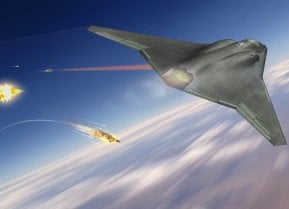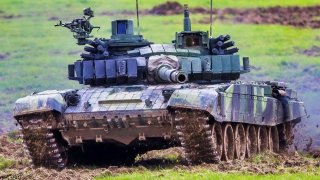A Russia on the Decline Is a Clear Threat to NATO
In short, Russia’s decline would not result in greater security and stability in Europe in the foreseeable future. A threatened revisionist power will step up its nuclear and hybrid confrontation with the West while it still can, exploiting the opportunities presented by security and economic challenges facing Western countries.
Russia’s military aggression against Ukraine was a criminal act and strategic blunder of the Kremlin. The ill-fated attack has eroded Russia’s global and regional influence and shuttered its great power image. While a defiant Putin has touted Russia’s economic resiliency, the war has drained its coffers. Labor shortages, shrinking foreign assets, and dependence on the sales of oil point to a bleak economic future for Moscow. The recent upsurge in Russia’s military production has been a worrisome trend.
However, its wartime economy might have passed its peak, and the quantity of its military capabilities has not offset the shortages of advanced technologies and the paucity of adequate military training.
Russia’s economic, demographic, and military woes will unravel its global and regional standing. Still, a revisionist power in decline is no less dangerous than a revisionist power that is ascending. On the contrary, a dissatisfied and threatened power in decline can be more provocative and risk-acceptant, and capable of inflicting serious damage by irregular means.
To marshal public support for the Kremlin’s aggressive and costly foreign policy, the Russian government has nurtured a version of a neo-imperial nationalist ideology that eulogizes the Russian language, traditions, culture, and history, as written by the Kremlin.
This vision of Russia as a great power state has been sustained by Putin’s promises of reclaiming the “historically Russian” lands and reversing NATO’s eastward expansion. Regardless of the war outcomes, Russia’s geopolitical ambitions will outpace its economic and military performance. If the war drags on, the hefty price tag for military production and soldier payouts is unsustainable in the long run. If Russia retains its temporary control over the annexed Ukrainian territories, it will be required to divert significant resources to rebuild and govern them.
Simultaneously, Russia will confront the imperative of deterring NATO, which has seen a significant increase in the allies’ expenditures on defense. While NATO has affirmed that its military buildup has a defensive purpose and “poses no threat to Russia,” Russia certainly does not see it that way. The Russian leadership sees an existential threat in the growing power differential between Russia and NATO and a limited window of opportunity to achieve its political aims.
It remains highly unlikely that Russia will strike a NATO ally. Its motives for attacking Ukraine, which Russia sees indispensable to its security, history, and culture, are fundamentally different from its interests in the rest of Europe. Russia’s momentum in Ukraine may, however, embolden its incursion on other post-Soviet territories, most notably Georgia, Moldova, and Belarus, to restore a strategic buffer zone.
If not escalating horizontally by expanding the territory of the conflict, the Russian leadership can escalate vertically, by relying on nuclear and hybrid means. Nuclear saber-rattling has become routine for the Kremlin. If it has delayed the provision of requisite capabilities to Ukraine by its cautious Western partners, nuclear brinksmanship may stop working in the future. Confronting the challenge of restoring the credibility of its nuclear deterrent, the Kremlin may revive the nuclear arms race and weaken the pillars of non-proliferation.
By outfitting drones, hypersonic missiles, and lasers with nuclear capabilities and by sharing nuclear technologies with other malign actors, Russia’s nuclear escalation will heighten the risk of a nuclear catastrophe.
The most likely scenario of Russia’s virtual escalation will involve the intensification of influence operations designed to erode the Euro-Atlantic solidarity and support for Ukraine. A steep increase in defense spending in Europe threatens the European welfare state, already weakened by the economic recession, demographic changes, and a rise in migration.
While many European citizens share their governments’ position on higher investments in national defense, few are willing to foot the bill. Economic woes have contributed to the rise of the far-right in Europe. Today, fear and disorientation over the European countries’ future compounded by economic anxiety is the backbone of nationalist and Euroskeptic sentiment that Russia can effectively exploit.
In short, Russia’s decline would not result in greater security and stability in Europe in the foreseeable future. A threatened revisionist power will step up its nuclear and hybrid confrontation with the West while it still can, exploiting the opportunities presented by security and economic challenges facing Western countries.
About the Author
Dr. Mariya Y. Omelicheva is a Professor of Strategy at the National War College, National Defense University.
Image Credit: Creative Commons and/or Shutterstock.


